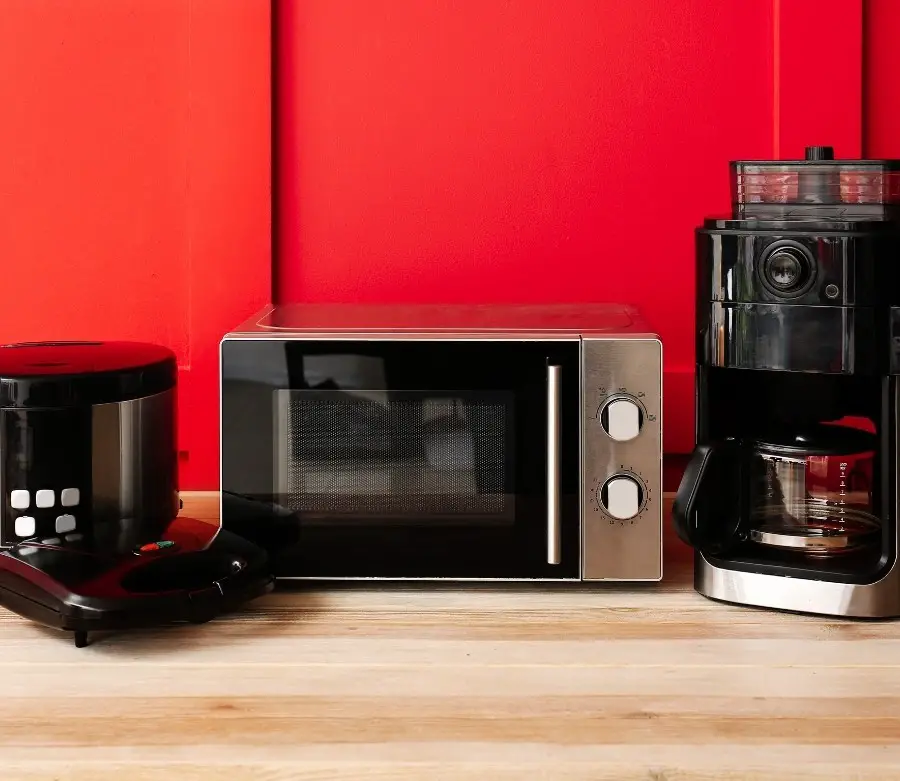
Generators are great tools to have in case of power outages or natural disasters that leave you without access to electricity. However, buying any generator can cause problems by not supplying you with the power you need to run common appliances.
What can you run on a 2,000-watt generator?
If you bought a 2,000-watt generator, it would definitely help you out in a time of need. You could run the following appliances with it continuously:
- Refrigerator.
- Freezer.
- Washer and dryer (with no heated water).
- Toaster or blender, when not using the washer and dryer.
Before you start looking for a generator, you need to know the wattage ratings it has and what they mean and the wattage needs of your appliances.
Without knowledge of this, you would likely overload your generator and cause a power surge.
Generator Wattage Basics
Figuring out how much wattage would work for running appliances and things you need would require you to first understand the terms rated power and surge power.
Once you understand these terms, you will be better equipped to choose a generator that is better suited for your needs.
Rated Power
Rated power is the wattage the generator can output continuously for its runtime. This is what you would look at when figuring out what would run multiple things for an extended period of time.
If you were looking to buy a generator for your house in case of a storm, you would want to have enough wattage to keep the following things running:
- Refrigerator.
- Deep freezer.
- A/C unit.
- Water heater.
- Oven/stove.
- Washer and dryer.
If all of these appliances were going at the same time, you would need a generator that could sustain around 10,500 watts. Although, it is likely that you could trim that down a bit by not using everything at the same time.
Surge Power
Surge power is a higher wattage than your generator can only sustain for a few moments. They are used in case of power surges from appliances or start-up power surges.
Some appliances have a higher start-up wattage requirement than their normal usage requirement.
What this means is that when you start an appliance, it uses a higher amount of watts at the start than it does for continuous use. It only needs a higher wattage for a few seconds, so your surge power covers those moments.
Wattage Requirements for Common Appliances
When trying to figure out how much wattage you need to run things in your house in case of a power issue, you have to look at the things you would most likely use.
For most people, they would use things listed under common appliances. These are things that are necessary for food safety, good hygiene, and food preparation.
| Appliance | Wattage Requirements Rated/Surge |
| Coffee Maker |
|
| Blender |
|
| Microwave |
|
| Toaster |
|
| Hair Dryer |
|
| Vacuum Cleaner |
|
| Refrigerator |
|
| Chest Freezer |
|
| Washing Machine (no heated water) |
|
| Central Air Conditioner |
|
| Water Heater |
|
| Oven |
|
Is a 2,000 Watt Generator Enough Power?
A 2,000-watt generator can be plenty of power for certain purposes, and you can pick and choose the things you really need so that it can be enough wattage, even if you don’t think it is.
It all depends on what you’re using it for, what you deem essential, or things that must be powered.
For Camping
Going camping will mean you are choosing to forgo a lot of the extra luxuries you use every day.
However, you can still bring some luxuries with you if you have a generator and not have to rough it as much as others. You will need to plan accordingly so you don’t take too much and overload your generator.
RV Use
For use with an RV, a 2,000-watt generator may not be enough power. You will likely want to keep the RV running most of the time, so that will take about 800 watts with a 1,000-watt surge start-up.
Then, an RV gives you plenty of space for appliances, so you have the option to use them, but you would lack A/C and lights if you did so.
If you were to use a 2,000-watt generator for an RV trip, you are likely going to have to turn off your lights and unplug things to use other appliances so you don’t cause a power surge. So, for an RV trip, 2000 watts is just not enough.
Tent Use
If you are going camping in a tent, you are likely to have more than enough wattage with a 2,000-watt generator. Things you are likely to need at your campsite are:
- Lights.
- Stove.
- Coffee maker.
- Any electrical chargers.
- Electric coolers, minifridges, anything to keep your food cool.
At night you may have to make a few choices about what you choose to use at one time, like choosing to make food over having string lights. But during the day, it is likely that you won’t have to choose one or the other considering you won’t need lights.
You could use your stove and lights at the same time and make coffee, but you will need to unplug one or two of those to make food.
Realistically, 2,000-watts is enough to supply your needs while camping at a campsite; just pay attention to what you have plugged in, and don’t overload it.
For Home Emergency Use
When using a 2,000-watt generator for your home, it can keep the bare essentials running, but you won’t likely be as comfortable as you want to be. You can most likely keep on your essentials that keep food from spoiling, such as:
- Refrigerator.
- Freezer.
- Second fridge or freezer.
- Electric Cooler.
You won’t want to use the lights unless absolutely necessary to help preserve fuel and power, but in a flood situation, you could use a sump pump to pump the water out of your house and still manage to keep your food cold or frozen.
This will give you peace of mind about having plenty of food staying cold enough but won’t give you enough power to cook it or warm it up.
You also won’t be able to run your washer and dryer with a 2,000-watt generator while keeping your food cold.
This can get you through a tough time, but it definitely won’t be easy or comfortable, and while having 2,000-watts is better than nothing, it’s probably best to aim for a higher wattage generator.
You always want to be prepared for anything when an emergency can threaten your health and safety.
Final Thoughts
If you are looking to buy a generator to supplement power in case of an outage or camping trip, you need to know the wattage of the appliances you are looking at running.
It may not seem like small appliances need much, but with only 2,000-watts, you may only be able to run two or three things at a time.
A 2,000-watt generator is likely to get you through a tough time, but it will not make it completely livable. Your food is likely to stay cold, but you won’t have access to heated water or cool air.
Sources:
https://www.donrowe.com/usage-chart-a/259.htm
https://www.generatorhero.com/2000-watt-generator-use-case/
https://www.batteryequivalents.com/what-can-you-run-on-a-2000-watt-generator.html
https://generatorist.com/faq-what-can-you-run-on-a-2000-watt-generator
https://enstorageinc.com/what-can-you-run-on-a-2000-watt-generator/
http://www.mea.coop/wp-content/uploads/2014/06/High-Bill-Packet.pdf
https://www.crowsnestcaravanpark.com/blog/10_step_guide_to_electric_hook_up.asp
https://campingaxs.com/what-can-you-run-on-a-2000-watt-generator/
